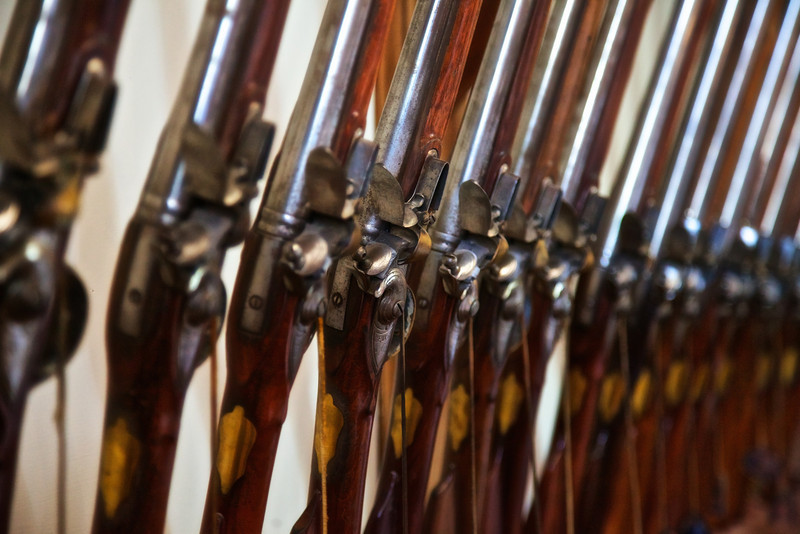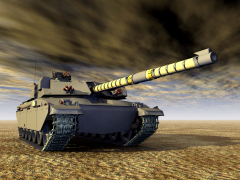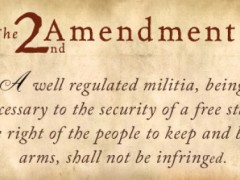In the swirling debate about gun sense (#gunsense) and gun rights, in which I too have participated, it is not widely known or often noted that Thomas Jefferson, the author of the Declaration of Independence, the nation’s first vice president, and third president, espoused the position that:
No freeman shall be debarred the use of arms [within his own lands or tenements].[1]
This startling statement, which so few know about or quote today, was made by Jefferson in his second and third drafts of the Virginia Constitution. The reason the brackets are around the words, “within his own lands or tenements”, is because Jefferson added these words after his first draft which did not include them. His first draft read:
No freeman shall ever be debarred the use of arms.
Jefferson made two additional revisions of this draft and in both subsequent versions he included the words “within his own lands or tenements.”
The statement by Jefferson is tantalizing in many ways and for many reasons. First, it shows that one very prominent founder thought that the right to use arms should be limited to use on one’s property, apparently restricting the right to use arms on public property or someone else’s property. One can assume that Jefferson understood the right to arms here as defensive and associated with the right to defend one’s life, an interpretation, by the way, that the Supreme Court also applied to the Second Amendment, in its recent decision (District of Columbia v. Heller). Jefferson seems to associate the right to use arms with the right to protect one’s life and one’s property and perhaps also for hunting. One can defend oneself and hunt with arms on one’s property. But interestingly enough Jefferson does not extend that right to the public domain. One cannot use arms in public. It is interesting too that in the Supreme court majority decision that focuses on the right to bear arms mentions this quote by Jefferson in passing but doesn’t make much of it.[2]
But Jefferson’s quote is very interesting and revealing, if not provocative for our current debates. The context in which Jefferson wrote this statement was historically and morally very significant indeed, much more so than the Supreme Court hinted at, and to get the full impact of this context it is necessary to share a bit of history of which only academics typically are aware. Before unpacking that historical context, however, it is worth pausing and thinking about it possible consequences.
***
Possible Compromise from Jefferson’s Statements?
One can argue that Jefferson’s statement about gun rights is one of the clearest statements among the founders’ writings and among state constitutions specifying an individual right to arms, but within circumscribed limit. As noted in earlier blogs, many of the State constitutions did not mention an individual right to bear arms and associated it instead with a right of States to conscript individuals.
But Jefferson seems to clearly envision an individual right to use arms but only in limited circumstances, when one’s property is being attacked, when one is defending one’s property or hunting on it. But Jefferson does not approve the use of guns in the public domain. Why not? We cannot be sure since he didn’t say. But one can guess that in the public domain one was to rely on the state to protect one’s safety, not on one’s own and therefore in the public domain or on someone else’s property one could be debarred the use of arms, without violating one’s right. Jefferson does not say explicitly that one cannot bear arms in the public domain but neither does his definition of the right make it clear that one has a right to bear arms in public either. He is silent on that question.
Could Jefferson, the writer of the Declaration of Independence, the ultimate defender of individual rights, and the Third President of the United States, offer us a compromise that both sides could live with? I would suggest that it could represent a possible compromise. Jefferson’s views could carry enough ‘founder’ weight to shape how the Supreme Court reads the second amendment and could align with the Court’s view that the second amendment is about the individual right to have a gun and protect oneself. It could mollify too those who want to limit the use of guns in society by allowing gun possession and use at home but not in public, unless the public grants those rights as in the case of hunting in some situations. It could possibly mollify also those who worry about protecting themselves against a tyrannical government, by allowing them to buy and use firearms on private property, but not in public.
The Historical Significance of Jefferson’s Comments
What makes Jefferson’s comments this weighty? Let’s look at the context in which they were written. The year was 1776 and Jefferson was in Philadelphia at the time about to be drafting the Declaration of Independence. On May 10, 1776, the Continental Congress had just adopted John Adams’s resolution recommending that the colonies assume all the powers of government in anticipation of the declaration of independence. Jefferson arrived in Philadelphia on May 14th, just a few days later. On May 15th, the Virginia Convention adopted its resolution calling for independence and appointed a committee to draft it plan of government.
This was the first state constitution drafted with the explicit intent to declare independence and become, in effect, its own country. On May 16th, Jefferson wrote a letter suggesting the Virginia delegates to Congress, himself included, be recalled to Virginia to work on the plan. It was not to be, and as a result Jefferson was left behind by his more senior colleagues and instead ended up staying in Philadelphia and drafting the Declaration of Independence, for which he is best known, and which became an emblem of American rights. But Jefferson did not ignore what was going on in Virginia. Jefferson drafted three drafts of the Virginia Constitution between May 27th and June 13, 1776, when George Wythe left Philadelphia carrying a copy of the third draft back to Virginia. The draft was to have some impact on the final version of the Virginia Constitution, which was already well along in its final form.[3]
It is not widely known that Jefferson’s drew heavily from his first draft of the Virginia Constitution when drafting the Declaration of the Independence for the colonies. One could even say that the Virgina Constitution was a dress rehearsal for the writing of the Declaration. [4] The context of these drafts, therefore, is highly significant. Jefferson drafted them as fundamental rights and a first constitution for his country of Virginia. The drafts discuss other primary rights that were also in the Virginia Declaration of Rights and later would make their way into the Bill of Rights. These include: liberty of religious opinion and freedom of press.
Thus at the moment that Virginia was drawing up its own independent state constitution and Jefferson was drafting the Declaration of Independence, we have a statement about the unequivocally individual right to bear arms that is less ambiguous than others and that contains a significant limitation. Not even the Virginia Constitution included such an explicit individual right. As I blogged before, the Virginia Constitution completely remained silent on the individual right to bear arms. It associated the statement of rights with the right of a State to have a militia. Here is the Virginia version of the right, which does not explicitly give this right to an individual:
That a well-regulated militia, composed of the body of the people, trained to arms, is the proper, natural, and safe defence of a free State; that standing armies, in time of peace, should be avoided, as dangerous to liberty; and that in all cases the military should be under strict subordination to, and governed by, the civil power.
Jefferson in his draft of the Virginia Constitution also referred to the danger of a standing army:
No freeman shall be debarred the use of arms [within his own lands or tenements]. There shall be no standing army but in time of actual war.[5]
Let’s look at the history of Jefferson’s changes as he moved through his drafts.
Draft one
No freeman shall ever be debarred the use of arms. No souldier shall be capable of continuing in peace.
Perhaps thinking that the first version didn’t make his ideas clear enough or contained what looked like a possible contradiction, Jefferson then made this revision:
Revision of draft one:
No freeman shall ever be debarred the use of arms. No souldier shall be capable of continuing in there shall be no standing army but in the time of <peace> actual war
Drafts two and three:
In his subsequent drafts, Jefferson then added in the critical limitation on the right to use arms.
No freeman shall be debarred the use of arms within his own lands or tenements. There shall be no standing army but in the time of actual war.
Given the profound significance of the context in which Jefferson wrote his interpretation of the right to arms, it seems worth considering whether those on both sides of the argument can find here a basis for compromise. That compromise would involve limiting the use and possession of arms to one’s private property. Justice Scalia has indicated that he envisions other possible limitations as well based on the meaning of the amendment at the time. [6] This first limitation would help move the country towards some compromise and some meaningful limitations that also help ensure citizens of their and their children’s right to life in the public domain.
_____________________
[1] The Papers of Thomas Jefferson. vol. 1. 1760-1776. Ed by Julian P. Boyd, Princeton, 1950, p. 353, 363
[2]District of Columbia v. Heller, 554 U.S. 570 (2008), 602. This critical Supreme Court decision remarks on Jefferson’s comment only that “Other States did not include rights to bear arms in their pre-1789 constitutions—although in Virginia a Second Amendment analogue was proposed (unsuccessfully) by Thomas Jefferson.” As we shall see this hardly does justice to Jefferson’s statement or the context.
[3]Boyd, ibid, 329-337. See also my Liberty in America’s Founding Moment, 53-66.
[4]See my Liberty in America’s Founding Moment, 53-66.
[5] Boyd, ibid., 344, 353, 363.
[6]See, for example, http://www.nydailynews.com/news/politics/supreme-court-justice-antonin-scalia-bear-arms-unlimited-noted-future-limitations-decided-future-cases-article-1.1124408 and http://www.huffingtonpost.com/2012/07/29/antonin-scalia-guns_n_1715969.html




